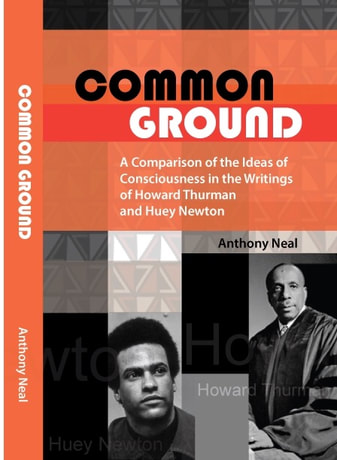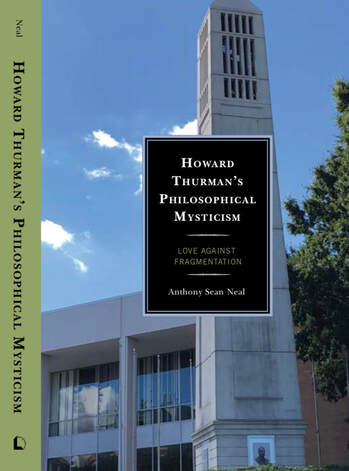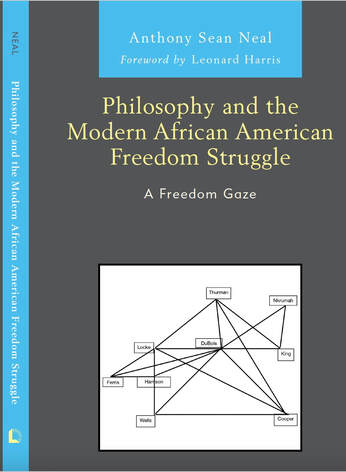
Common Ground: A Comparison of the Ideas of Consciousness in the Writings of Howard Thurman and Huey Newton, (Africa World Press: 2015).
Photographs Courtesy of Gary Freedman/Camera Press and BU Photography.
"In the dialectics of struggle the road to freedom comes paved with multiple and sometimes disparate ideologies. Newton and Thurman make for great comparisons because they use different sources from different schools of thought, and yet—as Neal’s book teaches us—they both put forth ideas of community development based on a transformation of consciousness."
--Felipe Hinojosa, Texas A&M University
Photographs Courtesy of Gary Freedman/Camera Press and BU Photography.
"In the dialectics of struggle the road to freedom comes paved with multiple and sometimes disparate ideologies. Newton and Thurman make for great comparisons because they use different sources from different schools of thought, and yet—as Neal’s book teaches us—they both put forth ideas of community development based on a transformation of consciousness."
--Felipe Hinojosa, Texas A&M University

Howard Thurman’s Philosophical Mysticism: Love Against Fragmentation, (Lexington Press: 2019).
"In Howard Thurman's Philosophical Mysticism: Love against Fragmentation, Anthony Sean Neal convincingly makes the case for Howard Thurman being an unduly neglected African American philosopher who sought to improve the lived conditions of black people in the United States, as well as affirm their God-given worth during what Neal calls the “Modern Era of the African American Freedom Struggle” (1896–1975). Neal also explains how Thurman synthesized a vast array of personal, philosophical, and theological sources—ranging from his Grandma Nancy’s slave religiosity and the Negro Spirituals to black theology to poetics to Neoplatonism, intuitionism, and process thought into an eclectic yet coherent philosophical theology that makes sense of his own experiences as a black mystic philosopher, poet, and pastor living in a racially segregated United States. It is well worth reading!"
— Dwayne Tunstall, Grand Valley State University
"Anthony Neal has written the authoritative text on the meaning and substance of Howard Thurman’s philosophy. Anthony Neal did not simply write a careful exegesis of Howard Thurman’s pre-existing work, he wrote a book that leads the reader through an understanding of Black philosophy as active thinking—as a multi-leveled consciousness about the potential in the world, the obstacles to its more perfect end, and the mysticism that justifies the belief in the unrealized. Thurman often ended his books with a multi-titled designation of himself as a “Poet, Mystic, Philosopher, and Theologian.” The fineness of Neal’s writing about Thurman’s thought undoubtedly takes possession of those designations that Thurman once called his own."
— Tommy J. Curry, Texas A&M University
"In Howard Thurman's Philosophical Mysticism: Love against Fragmentation, Anthony Sean Neal convincingly makes the case for Howard Thurman being an unduly neglected African American philosopher who sought to improve the lived conditions of black people in the United States, as well as affirm their God-given worth during what Neal calls the “Modern Era of the African American Freedom Struggle” (1896–1975). Neal also explains how Thurman synthesized a vast array of personal, philosophical, and theological sources—ranging from his Grandma Nancy’s slave religiosity and the Negro Spirituals to black theology to poetics to Neoplatonism, intuitionism, and process thought into an eclectic yet coherent philosophical theology that makes sense of his own experiences as a black mystic philosopher, poet, and pastor living in a racially segregated United States. It is well worth reading!"
— Dwayne Tunstall, Grand Valley State University
"Anthony Neal has written the authoritative text on the meaning and substance of Howard Thurman’s philosophy. Anthony Neal did not simply write a careful exegesis of Howard Thurman’s pre-existing work, he wrote a book that leads the reader through an understanding of Black philosophy as active thinking—as a multi-leveled consciousness about the potential in the world, the obstacles to its more perfect end, and the mysticism that justifies the belief in the unrealized. Thurman often ended his books with a multi-titled designation of himself as a “Poet, Mystic, Philosopher, and Theologian.” The fineness of Neal’s writing about Thurman’s thought undoubtedly takes possession of those designations that Thurman once called his own."
— Tommy J. Curry, Texas A&M University

Philosophy and the Modern Era of the African American Freedom Struggle: A Freedom Gaze, (Lanham, MD: Lexington Press, 2022)
"Ranging across nearly a century of Africana intellectual history, Anthony Sean Neal offers an ambitious and sweeping thematization of diverse approaches to the long struggle for freedom. Neal’s articulation of the ‘Freedom Gaze’ provides a crucial tool not only for understanding that history, but our present struggles and possible futures."
— Michael J. Monahan, University of Memphis
"In Philosophy and the African American Modern Freedom Struggle, Anthony Neal explains and describes what he calls the “modern era of the African American freedom struggle,” an era that lasted from 1896 to the mid-1970s. Neal takes a representative selection of works by modern Africa American activists, intellectuals, and scholars and discloses an ethnic reflective canon for the modern era of African American struggle. Neal ends the book with a provocative claim: Since the 1970s, Black intellectuals and other Black elites have abandoned the African American freedom struggle for the quixotic promise of integrating into an individualist liberal society. Neal leaves readers with the task of imagining what a viable African Americans freedom struggle would look like in our current age of cultural and socioeconomic fragmentation among Black people."
— Dwayne Tunstall, Grand Valley State University
"Ranging across nearly a century of Africana intellectual history, Anthony Sean Neal offers an ambitious and sweeping thematization of diverse approaches to the long struggle for freedom. Neal’s articulation of the ‘Freedom Gaze’ provides a crucial tool not only for understanding that history, but our present struggles and possible futures."
— Michael J. Monahan, University of Memphis
"In Philosophy and the African American Modern Freedom Struggle, Anthony Neal explains and describes what he calls the “modern era of the African American freedom struggle,” an era that lasted from 1896 to the mid-1970s. Neal takes a representative selection of works by modern Africa American activists, intellectuals, and scholars and discloses an ethnic reflective canon for the modern era of African American struggle. Neal ends the book with a provocative claim: Since the 1970s, Black intellectuals and other Black elites have abandoned the African American freedom struggle for the quixotic promise of integrating into an individualist liberal society. Neal leaves readers with the task of imagining what a viable African Americans freedom struggle would look like in our current age of cultural and socioeconomic fragmentation among Black people."
— Dwayne Tunstall, Grand Valley State University
